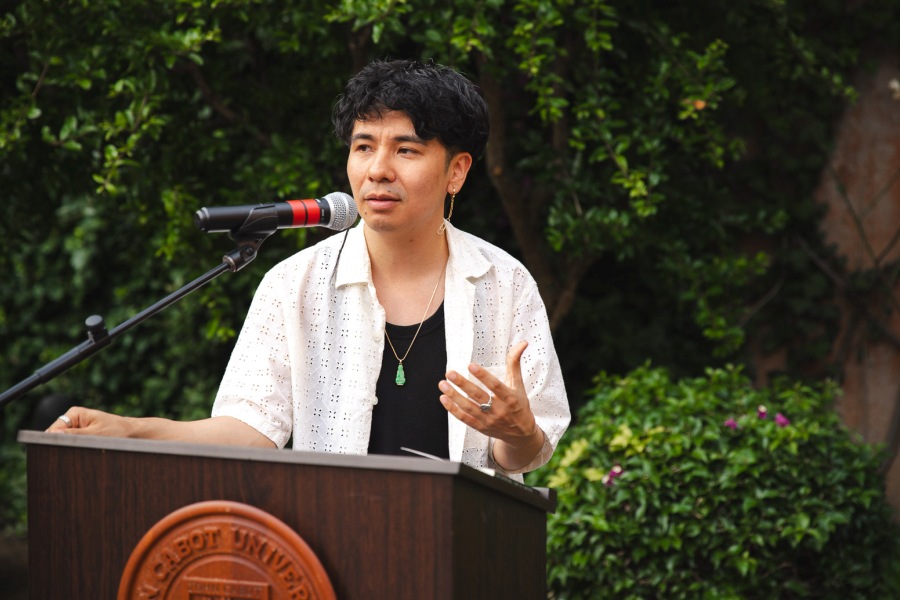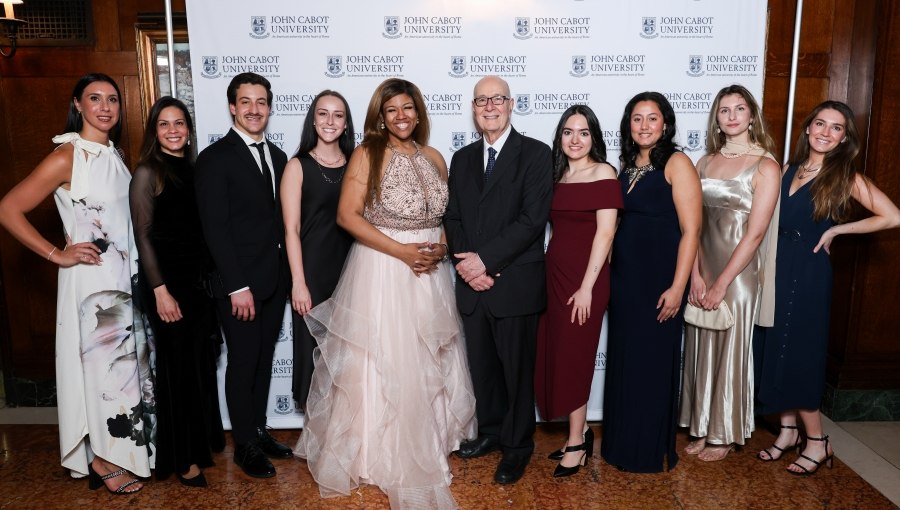John Cabot University Welcomes Acclaimed Author Ocean Vuong
On Tuesday, June 11, 2024, the Institute of Creative Writing and Literary Translation hosted acclaimed poet and fiction writer, Ocean Vuong, in his first reading in Rome.

From Saigon to NYC
Ocean Vuong is the author of The New York Times bestselling poetry collection, Time is a Mother (Penguin Press 2022), and The New York Times bestselling novel, On Earth We’re Briefly Gorgeous (Penguin Press 2019), which won the Mark Twain Award. His work has been translated into 38 languages.
Vuong’s writings have been featured in The Atlantic, Granta, Harpers, The Nation, New Republic, The New Yorker, The New York Times, The Paris Review, The Village Voice, and American Poetry Review, which awarded him the Stanley Kunitz Prize for Younger Poets. Selected by Foreign Policy magazine as one of its 100 Leading Global Thinkers, Ocean has received the MacArthur Genius Award and has been profiled on NPR’s “All Things Considered,” PBS NewsHour, Teen Vogue, Interview Magazine, Poets & Writers, and The New Yorker.
Born in Saigon, Vietnam, and raised in Hartford, Connecticut in a working-class family of nail salon and factory workers, he earned a BA in Nineteenth Century American Literature from Brooklyn College and subsequently received his MFA in Poetry from NYU.

He currently splits his time between Northampton, Massachusetts, and New York City, where he serves as a tenured Professor in Modern Poetry and Poetics in the MFA Program at NYU.
Writing as an act of curiosity
Vuong began by announcing that he had just learned that his books had been banned in a town in Texas, so he chose to read from his poem about a gay couple murdered by immolation in 2011, “Seven Circles of Earth.” After reading from other poems in his two collections, Night Sky with Exit Wounds (2019) and Time is a Mother (2022) as well as new work, Ocean Vuong invited audience questions, where he shared his insights on the art and place of writing and reading today.
Responding to a question about the demands of writing poetry versus fiction, he asked the audience to think about why we prioritize genre over vision, and then to contemplate what vision means, and its relation to desire. Distinctive styles, in his view, are motivated by that desire that then finds its ways and means of expression or “its own architecture.” Writing is an act of curiosity, in his view, and he sees himself as an “apprentice of the sentence” – an apprenticeship that led him to reflect on his appreciation of the creativity he observed was needed by his own family to navigate the challenges of their precarious working-class environments. He marveled at how they managed, through their inventiveness, not just to survive, but to achieve remarkable things on near-poverty wages.
He claimed his mother saw him as a disobedient child and believes that it is precisely that quality of disobedience that is essential to realizing what he desires in his writing. Artists must reject certain cultural expectations or pressures to realize their vision. He then offered his view on the soft colonialism of the novel form as hijacked by the common conception of it from the nineteenth century, when arguably its form can be traced to much earlier sources like oral traditions or the interiority offered by the 11thcentury writer, Murasaki Shikibu, and beyond. He sees the novel form as capacious and fluid, like water, in that it can contain things and enact its own form at the same time. He advocates releasing ourselves from genre expectations which he believes are potential cages we should slip out of to maintain the “rare moment of freedom” in our lives, offered by the page.
Language as the ultimate piazza
An audience member asked him to comment on the vulnerability involved in writing. He suggested that to be human is to be vulnerable, and that our existence is dominated by our creation of facades, but that writing is about letting that vulnerability come through, rather than trying to manage or eliminate it. He follows Latin playwright Terence’s view that nothing human is foreign to him as a writer. He believes that if he feels things, other people will have felt those things, too, and that writing involves an act of faith. He credits reading and being a reader with his understanding of this basic truth. He sees language as the “ultimate piazza” or square, where people can encounter anything, where all is permissible, and where the final stage of reading is inside each of our minds. Our reading is necessarily a unique experience given that we all have different associations with words and their meanings. As a result, literature changes with us and between us. He believes that our vulnerabilities mean humans operate in “virtual realities” and “hallucinations” and that fighting for the defense of literature is important because it relates to our humanity, as literature offers a place where our facades can be examined. Books offer a sort of intimacy between humans where a community can be created, and an understanding can be shared.
Creativity as making and resisting
Vuong was asked how important it is to say “no” to things as an artist. He talked about rejection as a reality for poets, and the conservative nature of the publishing world where work must be comparable to other work to be published, while there is also a paradoxical desire that writing should be unique and “new.” He sees the “no” instinct in an artist to be philosophically important when the culture demands that the artist produce things in a certain way for the sake of publication or popularity. He advised young writers not to take themselves too seriously, but to take the work seriously, so that they can defend their productions to the publishing industry. He sees creativity as about “20 percent making and 80 percent resisting” the demands of other entities outside and inside us. He cited Melville’s Moby Dick, as an example of artistic disobedience or that ability to say no to cultural demands to realize a vision that went against all popular expectations in novels.
The political nature of writing
Another audience member asked Ocean Vuong to comment on the political nature of writing today and the importance of expressing identities outside of cis norms or the privileged perspective of White males, and he suggested that it was a particularly wonderful time to be a writer. Contemporary writers, whatever their identity, in coming later to an archive of great writing, have the luxury of rich resources to draw from and commune with. He also said that he tells his White writing students that they have a wealth of opportunities to ask new questions about that archive and the world, to express new or ignored identities or visions and that they should not feel trapped by a heritage that might have offered limited visions in the past. The “beautiful thing about books” is that the whole archive of human production is at our disposal, to learn from and to do with what we can imagine, to make our own communities and connections with readers, which he sees as embedded in the roots of an oral tradition of storytelling.
Being disobedient to cultural expectations
Prompted by Vuong’s poetic line, “yellow pain gets pressed into gold,” an audience member asked him to comment on the recent film American Fiction, about a Black writer navigating and pandering to audience expectations to ensure sales. Ocean responded by saying that because he believes he will always be misunderstood as a person of color, he simply accepts this reality and writes what he wants. He thinks it is important to seize this liberty, but he also is aware of African American civil rights activist W.E.B. Dubois’s sense of double consciousness, and he believes that what is in the center of one’s life – whatever that is – as a person of color or otherwise – should not be censored or edited out of one’s art because to do so is to deny oneself and to pander to expectations in a different way. Again, it comes down to a choice to be disobedient to cultural expectations, so that the artist “goes to bed at night knowing that their curiosities are at the center of their work.”
Vuong described how as a Vietnamese immigrant growing up in Hartford in Black and Brown communities, he, ironically, did not know that America was mainly White until he started to go to shopping malls. He cited Black American writers as mentors who have been as important to him as Melville or Hemingway. He referenced Toni Morrison’s awareness that while she was writing Sula for young American Black women, she also knew that it would be read by a mainly White audience. He also cited the innovative brilliance of James Baldwin’s Go Tell It on the Mountain to chart Black history, as a formative novel when he came to write On Earth We’re Briefly Gorgeous.
Ocean Vuong left his audience spellbound with the breadth of his reading and thinking and stimulated by his insights into the importance of words in the world. Creative Writing students and faculty were able to meet and speak with him more informally in a private reception that followed this extraordinary reading and discussion.





